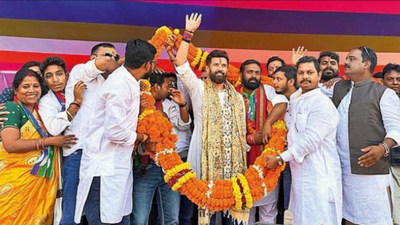ARTICLE AD BOX

For NDA, Union minister Chirag Paswan-led LJP (RV) is contesting 15 of its total 28 seats and Jitan Ram Manjhi-led HAM (Secular) all six of its constituencies in the second phase of elections
NEW DELHI: NDA and Mahagathbandhan face the challenge of retaining their bastions and making fresh headways in the last phase of Bihar polls, and much will depend on whether their smaller allies, which will be fighting a majority of their seats on November 11, can deliver after having driven a good bargain from their principal partners. For NDA, Union minister Chirag Paswan-led LJP (RV) is contesting 15 of its total 28 seats - the nomination of one of its candidates was rejected - and Jitan Ram Manjhi-led HAM (Secular) all six of its constituencies in the second phase of elections. While both Paswan and Manjhi are Dalit mascots of the governing alliance, its Kushwaha face Upendra Kushwaha, too, has a lot at stake as his candidates, including his wife Snehlata Kushwaha, are in the fray in four of the six seats his party, RLM, was allotted. If BJP-JDU alliance has to change its fortunes in Magadh region, where RJD-led MGB had won 20 of 26 seats in 2020, its two key Dalit constituents have to make it count on the 11 constituencies they are contesting in its five districts. A share of 29 seats for Chirag had triggered some heartburn within NDA, and he has often harped on his 100% strike rate in Lok Sabha elections to raise his bargaining power within the alliance.
For MGB, Congress is contesting 37 of its 61 seats and Vikassheel Insaan Party (VIP) seven of its 12 seats, of the total 122 constituencies going to the polls on Tuesday. The opposition alliance is banking on Mukesh Sahani-led VIP to swing the Nishad votes, who account for 2.6% of the total population, according to the state's caste survey. Sahani was a part of NDA in 2020, and MGB has walked the extra mile to keep the 'son of Mallah' in good humour, agreeing to his demand for naming him as its deputy chief ministerial choice if elected to power. The Tirhut region has been a traditional stronghold of NDA, and MGB is hoping to push the ruling alliance back there. NDA currently holds 23 of the 30 seats that go to the polls on Tuesday and eight of the 10 in Madhubani district, a part of Mithilanchal region, another bastion of the ruling alliance. Among the various forces at work in these polls, in no region have they drawn more attention than Seemanchal, which has the highest concentration of Muslims in Bihar.
Asaduddin Owaisi-led AIMIM is again in the fray there, having stumped MGB in 2020 with victories in five of 24 seats in its four districts. Congress is fighting on 12 seats in this region, as against RJD's nine. NDA had won 12 seats in Seemanchal in 2020, and alliance members believe that if AIMIM manages to draw a section of Muslim votes, then they can do well on the back of Hindu consolidation. However, the calculation guiding MGB is that Muslims will solidly back it this time, and it can significantly boost its numbers by also cornering a section of Hindu votes. Jan Suraaj Party founder Prashant Kishor, too, has run an energised campaign to create a third pole in the state's binodal politics, and a record turnout of over 65% in the first phase of polls on November 6 has made him as well as the two main alliances claim popular support. Which means that a similarly high turnout on Tuesday will only further the puzzlement over who actually is gaining from the enthusiasm of the electorate. JDU was the lead NDA player in the first phase of polling as it contested 57 seats, as against BJP's 48. In the second phase, BJP will contest 53 compared to JDU's 44. For MGB, RJD is contesting 71 seats and CPI(ML) six in this phase amid "friendly fights" among its constituents on several seats.

 1 hour ago
6
1 hour ago
6









 English (US) ·
English (US) ·